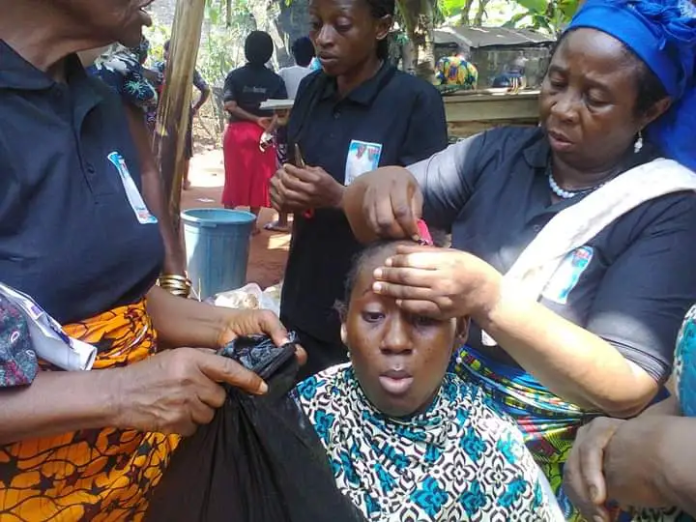BY CHIBUZOR ISHICHEI
IT may put a sour taste in the mouth that some harmful practices are still being practised in some areas in the country, and in some Christian communities, for that matter. Where is the Christianity? One may be pushed to ask.
Harmful widowhood practices, defined, are traditional customs and rituals that widows are expected to follow after the death of their spouses, which often violate their Human Rights and cause physical and emotional harm. Some examples of harmful widowhood practices include forced shaving, isolation and confinement, property, forced remarriage, rituals and many more.
Harmful widowhood practices have been a part of the Nigerian culture for centuries, varying across different ethnic groups. The practices are rooted in beliefs that view women as inferior to men. Some harmful practices in Igbo culture include forced shaving, isolation, drinking water used to wash corpses, and Nkuchi (widow inheritance).
However, the good news about some of these cultural practices is that they are being wiped out of the system because they have severe physical, emotional and economic consequences for the women. However, the women and men are not sitting idly by on the matter.
Recently, Nigerian Human Rights Advocate, Scholar and Founder of Alleged Witches Association, Dr Leo Igwe, called on the state governments and traditional authorities to take decisive actions against harmful widowhood practices. According to reports, this followed a recent incident in Imo State where relatives allegedly attempted to force a widow to drink the water used in washing her late husband’s corpse.
The victim, identified as Chika Ndubuisi, was accused of killing her husband through witchcraft in Awomama in Oru East Local Government Area. She was allegedly compelled to undergo the rituals before intervention came.
Accordingly, the matter was reported, prompting immediate action from the group, which alerted the Police, the Imo State chapter of the International Federation of Women Lawyers, the National Human Rights Commission and other Civil Rights Organisations, the Imo State government, and, upon notification, swiftly intervened and ensured the woman’s safety.
Dr Igwe said, “forcing widows to drink corpse water is an inhumane and degrading practice which must stop.”
The Chairman of the Human Rights Advocacy group, Dr Igwe, said that there are ongoing efforts to address the harmful practices, which he mentioned to include legislation, education and awareness, and other support services. He stressed that education and awareness are very necessary and key to the whole issue because most of the people involved in the whole thing are not even aware of the dangers and consequences of their actions.
He asked, “How many of them know that what they are doing causes physical and emotional harm or violation of Human Rights, or know what Human Rights are to the category of persons involved in the deals? So, a lot of education and enlightenment is needed to stop the harmful practices. Most of the people still believe that women are inferior to men’’ he said, adding that it will take a long time to change their minds on the matter.
He, however, agreed that in the post-colonial era, the practice continued with some modifications in areas such as widow inheritance, sexual cleansing, seclusion and dress code.
Also speaking on the issue, Mr Francis Okocha, an activist, said that harmful widowhood practices still exist in our societies today despite efforts to eradicate them, because the practices are deeply rooted in traditional and cultural beliefs, making them difficult to eliminate.
Besides that, he also noted other factors such as poverty, education, social pressure and resistance to change the status quo, which he said is one of the major factors. He added that some of the harmful practices that still exist today include force shaving of hair, isolation and confinement, and widow inheritance, and said that most of these problems could be tackled by legislation and education.
Continuing, he pointed out that fear of losing membership is genuine for some churches, but despite these challenges, many churches and faith-based organisations are actively working to address harmful practices and promote positive change.
Generally, people’s reactions to harmful widowhood practices in Nigeria vary. But many view them as outdated and oppressive. Some individuals, particularly women’s rights and advocacy groups, argue that the practices are against gender inequality, violence and Human Rights abuses against women.
Most people see harmful widowhood practices as something outrageous, which must stop and be totally wiped out because they have severe physical, emotional and economic consequences. It was gathered from reliable sources that there is a growing movement to address the issues, with advocacy groups pushing to stop the harmful practices.
With the way things are going, there is no doubt that there will be light at the end of the tunnel. Nobody is saying yes to harmful practices. It is all no, no to harmful widowhood practices. So the harmful practices must go.


